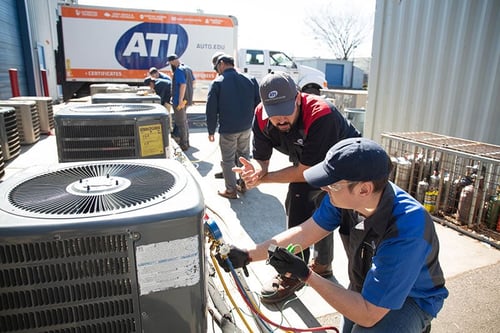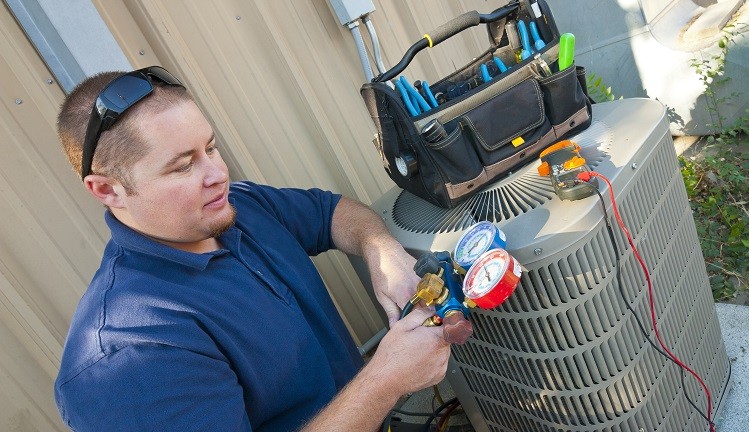Residential Emergency AC Service for Rapid and Reliable Air Conditioning Repairs
An In-Depth Look at HVAC Services and Their Influence On Power Performance and Cost Savings
The function of heating and cooling solutions in enhancing energy effectiveness and attaining cost savings is a lot more vital than ever, as home owners and services look for lasting remedies in a significantly eco-conscious world. With technological developments like clever thermostats and high-efficiency elements, the capacity for enhancing system performance is huge. Yet, real impact of these developments depends mainly on normal upkeep and aggressive concern monitoring. As we discover the elaborate connection between a/c systems and operational costs, including the change towards eco-friendly alternatives, the inquiry emerges: just how can these methods be successfully implemented to optimize both economic and environmental advantages?

Value of Cooling And Heating Equipments
cooling and heating systems are an essential part of contemporary structures, playing a crucial duty in keeping healthy and comfortable interior atmospheres. These systems, encompassing home heating, ventilation, and air conditioning, are important for managing temperature, moisture, and air high quality, thus ensuring the well-being of occupants. Reliable heating and cooling systems contribute substantially to creating an optimum indoor environment, which is important for both domestic and commercial areas.
In industrial structures, cooling and heating systems are indispensable to offering a secure and efficient atmosphere. By controlling interior climate conditions, these systems aid prevent the development of mold and mildew and the spread of airborne impurities, hence protecting the wellness of clients and staff members. Additionally, in household settings, cooling and heating systems improve living conditions by providing consistent thermal convenience and enhancing indoor air high quality, which is essential for total health.
In addition, the style and maintenance of cooling and heating systems have a direct influence on power consumption and operational costs. Effectively designed and preserved systems can dramatically reduce energy usage, resulting in minimized energy costs and a smaller sized carbon impact. The efficiency of these systems hence plays a crucial role in promoting sustainability and energy conservation within buildings, highlighting their significance in the contemporary building landscape.
Developments in A/c Modern Technology
Innovation in heating and cooling innovation is transforming the method structures handle interior climates, introducing a brand-new period of effectiveness and control. Recent innovations have actually concentrated on enhancing energy usage while enhancing user convenience. One remarkable growth is the combination of wise thermostats, which use man-made intelligence to learn tenancy patterns and adjust temperatures as necessary, minimizing unnecessary energy usage.
Variable Refrigerant Flow (VRF) systems stand for an additional considerable leap onward. These systems permit for exact temperature control in various areas of a building, boosting comfort and reducing energy waste. VRF technology is particularly valuable for huge industrial spaces, using adaptability and scalability.
Furthermore, the advent of Net of Things (IoT) devices has actually transformed cooling and heating systems right into interconnected networks efficient in real-time information collection and analysis. This connection allows anticipating maintenance, making certain systems operate at peak performance and reducing unanticipated downtime.
Moreover, advancements in materials and layout, such as using high-efficiency coils and compressors, have actually improved general system efficiency - Heating Contractor. The adoption of eco friendly cooling agents likewise emphasizes the industry's commitment to sustainability
These technical advancements are pivotal in minimizing functional costs and ecological influence, setting new standards for constructing environment management.
A/c Upkeep and Performance
Ensuring optimal performance of heating and cooling systems expands past technical advancements; it additionally depends upon efficient upkeep practices. Regular maintenance is critical for maintaining performance, reducing energy usage, and expanding the life expectancy of HVAC systems. The primary objective is to guarantee that all elements function at their peak possibility, thereby reducing energy wastage and preserving consistent interior convenience degrees.
Routine maintenance jobs, such as cleansing or changing air filters, inspecting cooling agent levels, and inspecting ductwork for leaks, are vital for stopping unneeded pressure on the system. Filthy or stopped up filters can block air movement, triggering the system to function more challenging and take in more power. Furthermore, inadequate refrigerant levels can lower cooling down effectiveness, causing higher operational expenses.
Additionally, routine evaluations by qualified specialists can determine potential concerns prior to they escalate right into pricey fixings or system failings. These inspections often include examining electric connections, adjusting thermostats, and making certain the general integrity of the cooling and heating system. By resolving minor troubles early, house owners and companies can avoid unanticipated malfunctions and improve power effectiveness.
Cost-efficient Cooling And Heating Solutions
For those seeking to get the most out of their home heating, air flow, and air conditioning systems without breaking the bank, discovering affordable cooling and heating remedies can make a substantial difference. One instant action is to buy programmable thermostats, which allow individuals to establish specific temperatures for different times of the day, optimizing energy usage and decreasing unneeded intake. By automating temperature adjustments, house owners can attain substantial cost savings on energy expenses.
Normal upkeep is one more important component of affordable a/c administration. Making sure that filters are cleansed or replaced regularly, ductwork is secured, and systems are serviced by professionals can avoid costly repairs and boost system longevity. Preventative upkeep not just maintains system efficiency yet likewise helps in staying clear of unanticipated malfunctions that can result in expensive emergency situation repair work.
In addition, retrofitting existing systems with energy-efficient elements, such as variable speed motors or high-efficiency compressors, can be a sensible investment. These upgrades boost operational performance, minimize power usage, and can usually be applied at a fraction of go to my blog the price of a full system replacement.
Ecological Influence Reduction
Lowering the environmental effect of A/c systems is critical in today's search of sustainable living. Cooling and heating systems are significant factors to power consumption, accounting for virtually 40% of energy use in business structures.
Technical advancements in heating and cooling style and operation, consisting of the integration of smart thermostats and energy-efficient heat pumps, are pivotal in minimizing carbon impacts. These advancements permit enhanced power usage, lessening wastefulness and improving total system efficiency. Additionally, adopting regular upkeep methods guarantees heating and cooling systems run at peak performance, additional reducing unnecessary energy consumption.
In addition, using eco friendly cooling agents is crucial, as conventional refrigerants, like CFCs and HCFCs, have actually been eliminated as a result of their ozone-depleting homes. Modern alternatives, such as hydrofluoroolefins (HFOs), deal minimized ecological threats, lining up with global ecological methods. By welcoming these sustainable techniques, a/c solutions can Extra resources play a transformative role in minimizing ecological effects, promoting power efficiency, and cultivating an extra lasting future.
Verdict

Furthermore, the style and upkeep of HVAC systems have a straight impact on energy consumption and functional costs. Regular maintenance is important for sustaining performance, reducing energy intake, and expanding the life period of HVAC systems. HVAC systems are significant factors to power intake, accounting for virtually 40% of power use in business structures. In addition, embracing regular upkeep techniques ensures HVAC systems operate at peak performance, more stopping unneeded energy usage.
The transition to environmentally pleasant HVAC systems even more advertises and visit homepage decreases operational prices sustainability. (Heating Contractor)